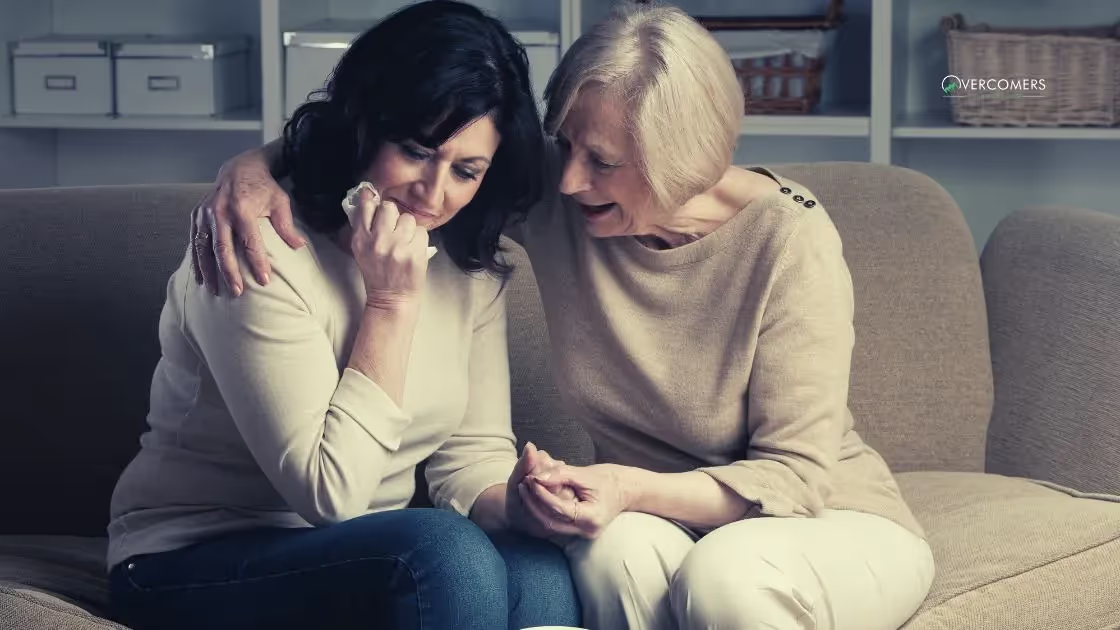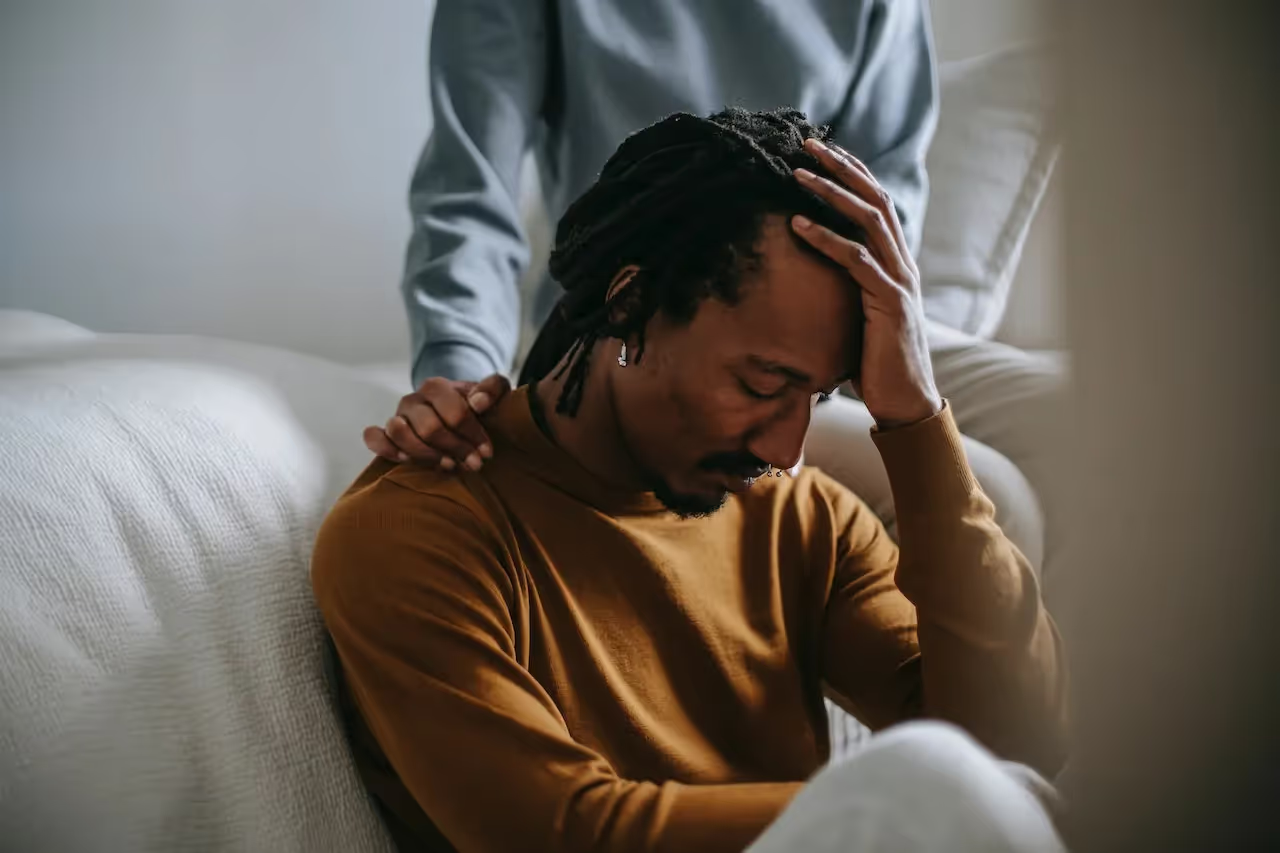The death of a loved one is one of the hardest experiences a person can go through.There are many emotions that happen during this time and learning how to...

The death of a loved one is one of the hardest experiences a person can go through.
There are many emotions that happen during this time and learning how to best navigate grief and loss can be a challenge.
And when someone you care about is grieving, it can be difficult to know what to say or do to help.
Here are a few things you can keep in mind that may help you comfort someone in grief.
One of the worst things you can do when someone is grieving is pretending like nothing has happened or try to downplay their loss.
This will only make them feel more isolated and alone. Instead, try to acknowledge what they are going through.
For example, you might say something like, "I'm so sorry for your loss." Other things you can say are, "I can't imagine how you must be feeling" or "Your loved one will be truly missed."

It can be tempting to try to distract a grieving person with platitudes or stories about other people who have faced similar losses.
But oftentimes, grieving people just want someone to listen to them and be present with them in their pain.
So instead of talking, try simply sitting with them in silence or asking them open-ended questions about their loved one and their experiences with grief.
Some open-ended questions you can ask are, "Can you tell me about your favorite memories with your loved one?" or "What has been the hardest part of this for you?"
When someone is grieving, they usually don't want advice�they just want your support.
So instead of telling them what you think they should do, try offering some practical help instead.
For example, you could offer to babysit their kids or cook meals for them so they don't have to worry about those things during such a difficult time.
Everyone grieves in different ways and at different speeds.
Some people may want to talk about their loved ones all the time, while others may not want to mention them at all.
Some may cry often, while others may internalize their grief and not show any emotion on the outside.
It's important to respect each person's journey and not compare it to your own or anyone else's.

What should I say to someone who is grieving?
It can be difficult to know what to say to someone who is grieving.
You may feel like you need to say something to make them feel better, but it is often more helpful to simply listen and be there for them.
It is also important to avoid saying anything that might make them feel worse, such as telling them that they should be grateful for what they have or that they need to move on.
What should I not say to someone who is grieving?
There are a few things that you should avoid saying to someone who is grieving.
One is telling them that they need to be grateful for what they have or that they need to move on.
Another is telling them that their loved one is in a better place or that everything happens for a reason.
These statements can often make the grieving person feel worse, as they may feel like you are invalidating their feelings or trying to downplay their loss.
How can I comfort someone?
There are a few things you can do to comfort someone who is grieving.
One is to simply be there for them and listen to what they have to say.
You can also offer your support in practical ways, such as helping with funeral arrangements or taking care of day-to-day tasks for them.
Additionally, you can send them a sympathy card or gift, or make a donation in their loved one's memory.
What if I don't know the person who is grieving?
If you don't know the person who is grieving, it is still possible to offer your condolences and support.
You can do this by sending a sympathy card or gift, making a donation in your loved one's memory, or attending the funeral or memorial service (if you are able).
You can also reach out to mutual friends or acquaintances and ask if there is anything you can do to help.
I am grieving myself, how can I get help?
If you are struggling with your own grief, it is important to seek out help from professionals or support groups.
Grief counselors can help you work through your emotions and come to terms with your loss.
Support groups can provide you with a space to share your experiences with others who are going through similar situations
If you are struggling to deal with your grief, our counselors can help. We will provide you with the support and guidance you need to work through your emotions and start to heal. Contact us today to get started.
If someone you care about is grieving, it's normal to feel helpless and unsure of what to do or say.
But by keeping a few things in mind�such as acknowledging their loss, listening more than you talk, avoiding giving advice, and respecting their grief journey�you can be an invaluable source of support for them during this difficult time in their life.
Grief can be particularly intense in the early days following a loss. However, it's not uncommon for grief to become more pronounced at certain times, like at night or in the morning. This can be due to the mind being busy processing the events that happened.
Grief can seem worse in the morning as the reality of the loss is often one of the first thoughts upon waking. This can be particularly true if you shared many mornings with the person who has passed away during wonderful years spent together.
It is not mandatory that all conversations revolve around the issue causing your grief but our therapists will provide guidance on how best to process the situation. You are in control of how much or little you want to share in a session, but it is important to stay open and honest with your therapist for optimal results.
There are many healthy ways to cope with the pain of a breakup. Some strategies include engaging in self-care activities, writing in a journal, reaching out to loved ones for support, and reframing your perspective. Additionally, seeking professional help can be an important step toward healing after a breakup.
It is completely normal to feel dread or even fear when thinking about the upcoming holiday season. One way to ease your anxiety is by planning ahead and being prepared for how you will deal with tough moments. If there are certain events you know will be difficult, try to come up with an exit strategy beforehand so you can leave if needed. It can also be helpful to talk to a therapist or counselor before the holidays to help you manage your expectations and emotions.
Addressing grief is crucial because unresolved grief can significantly impact your quality of life, overall well-being, and ability to function in daily activities. Left unaddressed, grief can lead to more severe mental health issues, such as depression, anxiety, and complicated grief.